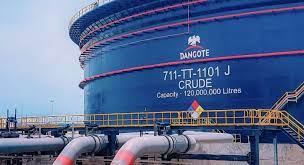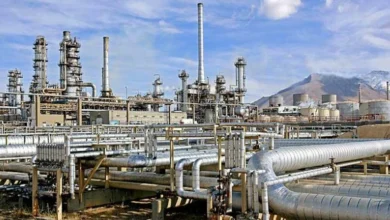Dangote Refinery: Too Big to Fail

Media reports that agents of the Economic and Financial Crimes Commission (EFCC) “stormed” the headquarters of Dangote Group have confirmed rumours that Mr. Aliko Dangote is not in the good books of the administration of President Bola Ahmed Tinubu. The position of Alhaji Dangote as the ultimate political insider and Nigeria’s preeminent businessman seems under threat. What is the implication for his biggest project yet, the $19 billion Dangote Refinery?
A Government-Protected Billionaire?
The Dangote Refinery, a $19 billion mega-project is touted as the largest single-train refinery in the world, with a capacity of 650,000 barrels per day. It is part of a larger complex that includes a fertilizer plant, a gas pipeline, and a petrochemical unit.
The completion of the refinery has been delayed by several years due to financing problems and technical hiccups; its cost has ballooned from an initial estimate of $9 billion to $19 billion. Mr. Dangote now faces a very unusual problem- the specter of disruptive government scrutiny of his business.


The refinery project fits into Dangote’s playbook of investing in sectors where government policy discourages competition and aids the accumulation of hefty profits: flour, salt, and especially cement. The federal government had issued over 80 licenses for private refineries, but uncertainty surrounding whether the fuel produced would be sold at a subsidised price had prevented experienced operators from risking billions of dollars in building a refinery in Nigeria.
Also Read: How Many Jobs Can Dangote Refinery Actually Create?
Fittingly, it was Mr. Dangote, a businessman widely viewed as a master in shaping government policy to his advantage, who decided to take the plunge and stake billions in a private refinery in Nigeria.
Nigerians have largely considered the exchange of iron-clad government protection for Dangote’s investment in manufacturing as a fair deal. Until now, the Dangote Refinery was positioned as an extension of this deal. The refinery is expected to transform Nigeria’s oil and gas sector, which has been plagued by decades of mismanagement, corruption, and underinvestment.
Despite being Africa’s largest oil producer, Nigeria relies heavily on imported fuel to meet its domestic demand due to the poor state of its four state-owned refineries. Dangote refinery promises to reduce this dependence and create thousands of jobs.
Signs that Mr. Dangote may no longer have the protection and access that he has enjoyed since the administration of former President Olusegun Obasanjo emerged quickly after President Tinubu came to power. He did not play the usual role of doyen of Nigeria’s private sector during the President’s foreign trips to court investment.
Concrete signs of trouble emerged when it was reported in late November 2023 that the Nigerian National Petroleum Corporation Limited (NNPCL), the state-owned oil company, had refused to supply crude oil to Dangote’s refinery. (The refinery has since taken delivery of one million barrels of oil from Shell International Trading and Shipping Company Limited (STASCO) and another two million barrels from the Nigeria National Petroleum Corporation Limited (NNPCL).
Also Read: Mixed Signals: NNPCL Denies Plans to Increase Petrol Price to N1,200
Theories of Political Change
Observers of Nigerian politics have advanced different explanations for Dangote’s apparent loss of political ranking. According to a Lagos-based economist, Mr. Dangote is not favoured by the administration of President Tinubu because he was the main supporter of the presidential ambition of the former Central Bank of Nigeria Governor, Godwin Emefiele. He explained that Mr. Dangote saw an Emefiele presidency as the only means of continued access to the privileged allocation of scarce foreign exchange.
A London-based Nigerian risk consultant considers the view that Dangote encouraged an Emefiele presidency as outlandish. According to him, Mr. Dangote could never have been so naïve to have taken such a huge political risk, knowing that Mr. Tinubu’s camp could ruin his refinery, based in the Lekki Free Trade Zone which is under their control, “by simply revoking its certificate of occupancy”.
A third explanation is that Mr. Dangote had spread his bet rather thinly by supporting all major candidates in the 2023 Presidential elections rather than decisively backing the APC candidate like one of Nigeria’s most popular bank founders.
Another view is that Tinubu’s regime is not favourable to Dangote as the president wants to create his own set of billionaires and reduce the influence of the business mogul. Tinubu, who is widely regarded as a political godfather in his southwest region of the country, has a reputation for grooming and empowering his loyalists and associates in various sectors of the economy.
Whatever explanation of Mr. Dangote’s loss of political influence is correct, what seems certain now with the EFCC raid on his headquarters is the fact that he has lost the golden access card to Aso Rock which he held since the early 2000s. It is highly unlikely that the EFCC would conduct a raid on the office of a high-profile businessman such as Dangote without the authorisation of Nigeria’s highest political authority.
Implications for Dangote Refinery
Will the Dangote Refinery (and other Dangote businesses) stumble through dangerous politically-motivated regulatory, legal, commercial etc. hurdles that could seriously impact its operations and profitability? Such difficulties could include trouble accessing foreign exchange, irregular supply of projected delivery of crude oil from NNPLC or even a policy that demands it sells crude at a subsidised price.
An oil and gas consultant to the federal government for nearly two decades who wishes to remain anonymous argues that none of these risks is likely to become reality because what Mr. Dangote is facing is temporary low-intensity political friction rather than a full-fledged or serious political assault on his business interests. According to him, the Dangote Refinery is “too big to fail”.
He explained that “even the most anti-private sector” government in Nigeria would understand the immense negative impact on Nigeria’s attractiveness as an investment destination if the viability of a $19 billion project that has been built with mostly foreign loans is threatened for political reasons. The veteran consultant believes that the raid on the Dangote HQ and Mr. Dangote’s less-than-warm relationship with the Tinubu administration is probably explained by the “vastness” of the Dangote business “unregulated” access to foreign exchange under Emefiele and the FGN’s desire to “claw back some of the dollars”.
The EFCC visit is part of the negotiation to extract concessions from Mr. Dangote who had said in an interview in response to a question on whether the NNPCL was asking for a bigger share in Dangote Refinery than its current 20%, “I don’t think NNPC needs to buy more shares. I think they’re OK with what we’ve given them.” Dangote Group had repatriated $687 million “from our African operations” early in November 2023 at the height of public attacks by the BUA Group over “fraudulent forex transactions“. Mr. Dangote may have to concede more to get the government off his back.
The lesson is that big businesses heighten political risk when they over-exploit close relationships with political or regulatory authorities. Mr. Dangote would have found it impossible to believe the loss of political influence and an EFCC raid on his HQ.







